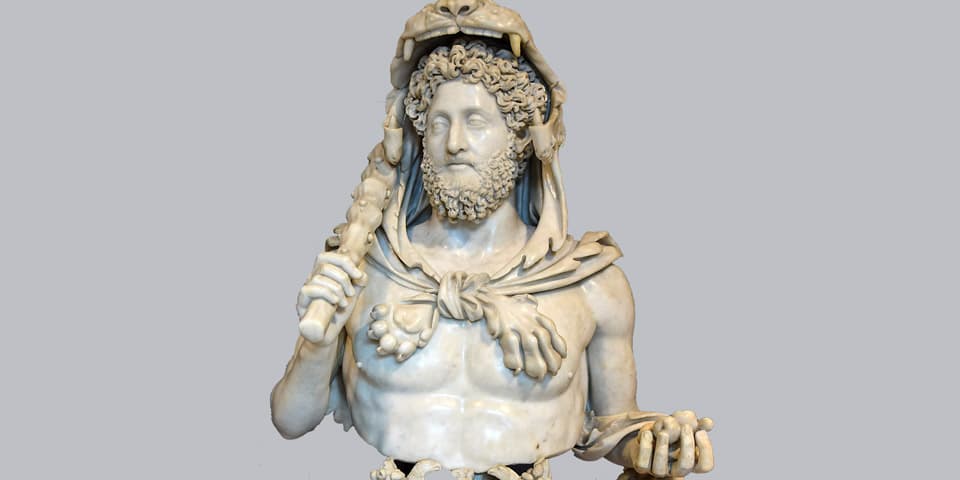

25082 views

Commodus, or Lucius Aurelius Commodus, was a Roman emperor with his father, Marcus Aurelius, from 177 to his father’s death in 180 and alone until 192. When he was a ruler along with his father, he accompanied Marcus Aurelius during the Marcomannic Wars in 172 and on a tour of the Eastern provinces in 176. Moreover, he was the youngest consul in Roman history in 177. Later that year, he became the co-emperor with his father.
It was the first case when a son succeeded his biological father since Titus and Vespasian in 79 AD
During his solo reign, the ancient Roman Empire experienced a period of reduced military conflict with a dictatorial style of rule. His assassination in 192 marked the end of the Nerva-Antonine dynasty.
Contents
ToggleLucius Aurelius Commodus was born to Marcus Aurelius and Faustina the Younger in Lanuvium, a city fourteen miles southeast of Rome, in 161. He was the tenth of fourteen children and the only surviving son. Commodus received an upbringing from his father’s physician, Galen, who treated many of his illnesses. Moreover, there were many teachers who participated in the education of young Commodus with a focus on intellectual education. Among his teachers were Onesicrates, Antistius Capella, Titus Aius Sanctus, and Pitholaus.
During the Marcomannic Wars in 172, Commodus was at Carnuntum. There he was given the victory title Germanicus, which suggests that he was present at his father’s victory over the Marcomanni. Later, in 175, he started his education at the College of Pontiffs, which became the starting point of a career in public life.
Marcus Aurelius was the first emperor since Vespasian to have a biological son. In 176, he granted Commodus the rank of “Imperator” and later, in 177, the title “Augustus,” which meant the formal sharing of power with his son
As an emperor, Commodus soon became a disappointment to Marcus Aurelius. Despite his education, he did not inherit any of his father’s work. After serving in battle on the northern frontier in 178 and 179, together with Aurelius, Commodus returned to Rome in 180 after his father’s death. During that period of time, he was only 18 years old and started to negotiate a peace settlement. Later, Commodus left the reins of power in other hands most of the time while enjoying his time full of leisure.
Commodus had lack of concern for political matters and suffered from paranoia
Since the emperor relied on the help of others to rule the Empire, there were many conspiracies against his life. He was considered to be easily manipulated. Moreover, one of the conspiracies was made by his older sister Lucilla and several senators in 182. She believed that her husband, Lucius Verus, had to be the next emperor after Marcus Aurelius. For this plan, Lucilla was exiled and executed after some time. Also, Paternus, the commander of the Praetorian Guard, was executed because of his connection to Saoterus’ assassination and to Lucilla’s plan.
Tigidius Perennis, who had served as the joint commander of the Praetorian Guard with Paternus, decided to use the opportunity and become closer to Commodus during his time full of difficulties. He wanted to gain governmental power. After the case with Lucilla, Commodus refused to give any public speeches and started to communicate with people only through the new chamberlain. Thus, the public speaking role was transferred to Perennis, who took it seriously. He eliminated any rivals to his authority but gained many enemies. Perennis became a wealthy man with many governmental responsibilities, so he started to consider himself the true emperor. However, his main enemy became Cleander, the ex-slave and member of the imperial household. In 185, Cleander leaked information to Commodus about the plan of Perennis to get the whole power and make his sons the future emperors. Commodus immediately ordered the execution of Perennis and his sons.
Cleander became a member of the emperor’s chamberlain. However, Commodus decided to return again to his life full of pleasures by leaving the right to rule in the hands of Cleander this time, who eventually had the same story as his predecessor. Cleander destroyed the system, where senatorial seats, governorships, and almost everything were for sale. Of course, some part of the money went to Commodus. Cleander wouldn’t remain for a long time. In 190, people gathered at the Circus Maximus for the riot. They cried for the head of Cleander and marched through the streets to the residence of Commodus at the Villa of Quintilli. Commodus feared for his life and gave people the head of Cleander, which was placed on a pole, and marched through the streets of Rome. Only this situation made Commodus understand that he has to rule himself.
Commodus became another person. He saw himself as a reborn Hercules, who appeared in public wearing a cloak created from the hide of a lion over his head. This sign referenced the Nemean Lion of Hercules’s Twelve Labors.
The Senate declared Commodus a living god
Commodus discarded his family name and issued orders to call him Hercules. He started to wear lion skin and erected statues of himself in different parts of Rome. Moreover, he renamed the twelve months and rebuilt Rome after a fire in 191. He changed the city’s name to Colonia Lucia Annia Commodiana, where citizens became known as Commodiani. Commodus even participated in gladiatorial contests against the physically handicapped and an array of wild animals from a raised platform.
On the 1st of January in 193, Commodus decided to celebrate Rome’s rebirth by fighting in the arena. His mistress Marcia, new chamberlain Electus and the new commander of the Praetorian Guard understood that he had gone too far. When they tried to talk to Commodus about his strange plans, he became angry with them and added their names to the long list of people he wanted to execute.
One day, Marcia brought Commodus a glass of wine with poison prior to his bath. However, the poison failed, and Commodus’ fitness coach, Narcissus, entered and choked him to death. People wanted to drag his body through the streets of Rome, but Pertinax, who succeeded Commodus, seized the body and placed it in the Hadrian’s Mausoleum.
Read also about: Gaius Julius Caesar.
Author: Kate Zusmann
This website uses cookies. For more info read the cookies policy
Rome.us © 2026. Created with love by Roman experts and guides.